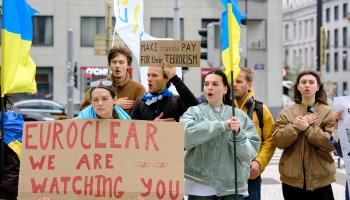EU proposals to deploy the proceeds of frozen Russian assets to fund Ukraine have encountered setbacks
At an EU summit on October 23, bloc leaders failed to convince Belgium to agree to an elaborate scheme to convert EUR140bn (USD161bn) in immobilised Russian Central Bank assets into a loan that would meet Ukraine’s military and budgetary needs until 2027. Failure to approve the plan would seriously threaten Western funding for Ukraine’s war objectives.
What’s next
The European Commission will look to find a way both to secure Belgium’s support and to avoid the likely veto of Hungary and Slovakia. One option being discussed is an agreement that falls outside the scope of normal EU law. The negative consequences for Ukraine and European security should the EU’s plan not materialise will concentrate minds, making a solution likely over the coming months.
Subsidiary Impacts
- For business, the use of Russian assets to fund Ukraine would make doing business in Russia even riskier for remaining EU companies.
- Defence companies will be key drivers of economic growth in the EU over the coming years.
- If the EU agrees to use the frozen assets, member states will face heightened hybrid security threats from Russia.
Analysis
Within days of Russia’s invasion of Ukraine in February 2022, the EU froze some EUR210bn of Russian Central Bank funds held in various member states. The G7 followed up with similar measures. Overall, the West immobilised an estimated EUR300bn that would remain frozen until Russia began reparations.
Most of the assets — some EUR176bn — had been held in government bonds in Euroclear, a Belgian-registered securities depository. When those assets matured into cash, the Belgian Central Bank placed them in low-risk accounts.
In October 2024, the windfall profits from the assets were used to underwrite a EUR45.0bn G7 loan to Ukraine, which included an EU macro-financial assistance (MFA) loan totalling EUR18.1bn.
EU proposals
By mid-2025, officials began looking at ways of using the assets short of outright confiscation. On September 10, European Commission President Ursula von der Leyen floated the possibility of a reparations loan, stating that the assets themselves would not be touched and that Ukraine would repay the loan once Russia paid for the reparations.
An internal European Commission note described a “tailored debt contract” between the EU and Euroclear at 0% interest, which would then generate a “limited recourse” loan to Ukraine. The operation would “not touch the sovereign assets of Russia… and it would be temporary, as it would be reversible”, once Russia compensated Ukraine.
The European Commission claims that its proposals would not constitute a confiscation of Russian assets
German Chancellor Friedrich Merz, previously opposed to the idea, wrote in the Financial Times that the assets should be converted into a loan underwritten by member state guarantees.
Belgian concerns
The main challenge to the plan has come from the Belgian government. Belgium’s primary concern is that it would be left alone to address any potential liabilities, as it is the country where most of the assets are frozen.
Belgium has other key concerns which it feels the European Commission has so far failed to address, including:
- the length of time member states would act as guarantors;
- how Ukraine should use the funds;
- whether any assets of Belgian companies seized by Russia would be protected; and
- how the risk would be shared if not all member states signed up.
Belgium is also concerned that the move could deter investment by other third countries if they perceive Belgium as a country where assets may be seized for political reasons.
This view was echoed by the European Central Bank (ECB), which has warned that confiscating the assets altogether could undermine the credibility and stability of the euro-area. ECB President Christine Lagarde has regularly warned that any asset-grab would have to comply with EU and international law.
Hungarian and Slovak objections
The only other member states that have criticised the plan to reuse Russian assets are Hungary and Slovakia, whose governments are sympathetic to Russia and its President Vladimir Putin (see HUNGARY: Ukraine policy may prove tough to sustain – September 9, 2025 and see SLOVAKIA: Two-track energy policy will be pursued – August 18, 2025).
Their objection poses another obstacle in the EU’s efforts to reuse the funds for Ukraine, as they argue that such a policy falls under the domain of sanctions, and that the plan therefore requires unanimous support among member states.
If unanimity is required, the plan will not succeed. Thus, the Commission will seek a way forward that only needs the approval of a majority of member states.
Possible options
Despite the difficulty in securing Belgium’s support, officials suggest that further detailed exchanges between the Belgian government and the Commission, with member-state officials closely involved, should unblock the plan, especially given the paucity of alternatives. Pressure from the US government may also focus European — particularly Belgian — minds.
Any institutional agreement that does not include unanimity will be legally challenged, thereby delaying and potentially derailing the plan. As a result, there is a widespread assumption that the text will be drafted as an intergovernmental agreement, so as to exclude those countries that are opposed and avoid vetoes.
If the deadlock persists, there is indeed a lack of alternatives. Few member states are enthusiastic about making large new national contributions, or about the EU taking on joint debt, where Brussels would borrow on behalf of member states to fund projects. Fiscally conservative countries, such as those in northern Europe, fear they would end up contributing more than poorer states.
The IMF has threatened to block funding to Ukraine if the EU proposals do not get approved
There have been suggestions that the EU could shift unspent COVID-19 recovery funds to Ukraine’s indigenous defence sector, or use ‘headroom’ funds from the seven-year budget (the Multiannual Financial Framework), but such ideas would also encounter legal obstacles.
Outlook
If the plan to reuse frozen Russian assets does not get approved, it will be a serious concern for Kyiv and a morale boost for Moscow. The European Council has made a solemn commitment to fund Ukraine until 2027, and national contributions are unlikely to make up for the funding gap that will be left if the assets are not used (see RUSSIA: US summit brings Ukraine closer to defeat – August 18, 2025).
Thus, the possible negative consequences for Ukraine make it likely that the Commission will prevail in delivering a text that has Belgian support and avoids the unanimity question. Reports that the IMF will block lending to Ukraine if the EU does not use the frozen assets to support Kyiv will add further pressure.




